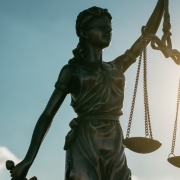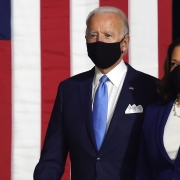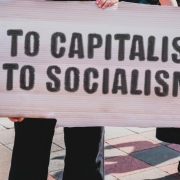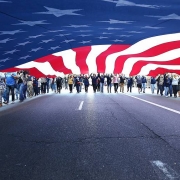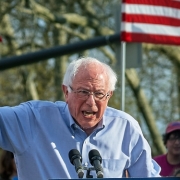“The future belongs to patriots,” President Trump told the United Nations last month. But when it comes to Americans, at least, the data seems to indicate the opposite. A Gallup poll released just before the Fourth of July found that the share of participants who felt “extremely proud” to be American was the lowest in the poll’s 18-year history—just 47%, down from 70% in 2003. And according to a recent WSJ/NBC poll, the younger you are, the less likely you are to say that patriotism is a “very important” value. Among Americans older than 55, nearly 80% of respondents agreed with that statement; among those under 38, only 42% did so.
Perhaps the shift has to do with the fact that, in a time of bitter political division, people often bring up patriotism only to suggest that their opponents lack it. President Trump, who during the 2016 campaign made a habit of literally hugging American flags, has accused House Speaker Nancy Pelosi of treason. Meanwhile, Sen. Kamala Harris said that former Vice President Joe Biden, her fellow Democratic presidential candidate, has “more patriotism in his pinkie finger” than President Trump “will ever have.” Members of both parties seem to see the other side as proof of Samuel Johnson’s famous definition of patriotism as “the last refuge of a scoundrel.”
Johnson, the English man of letters, coined that phrase in 1775, suggesting that the use of patriotism as a political football is hardly a new phenomenon. What does seem to be new in our time is the growing sense, on both sides of the aisle, that American patriotism as traditionally conceived is unworthy of support. At just the moment when the U.S. is most in need of common values and aspirations, we seem to be in danger of losing them. How to restore American patriotism? The first task is to understand what makes it unique—and so vulnerable.
American patriotism, like America itself, is a continuing experiment in the power of ideas to bring human beings together. Other nations form their identities around shared ethnic origins or ancestral experiences—things that are themselves often imaginary, based more on myth than history. But the word “fatherland,” so powerful in other languages, is alien to American usage, because our forefathers all came from different lands. Instead, the classic formulas of American patriotism are about moral and political ideas: “all men are created equal”; “government of the people, by the people, for the people”; “liberty and justice for all.”
By casting our national identity in terms of democratic aspirations, the Founders ensured that American patriotism would be self-critical. We are constantly measuring ourselves against the ideals of the Declaration of Independence and the Constitution, and since Americans are no more inherently moral than anyone else, we frequently find ourselves wanting.
This gives rise to the two threats that face our politics today. On the populist right, there is a temptation to see the nation merely as an impediment to the interests of one’s own tribe, whether that is defined in terms of race, region, religion or class. On the left, there is a complementary temptation to believe that American ideals have never been anything more than window-dressing for racial or class self-interest, so that achieving social justice means repudiating the nation and its claims.
Both of these lines of attack lead to a rejection of American patriotism as the demanding ideal it has been and should be again. A society as large and diverse as our own requires that ideal: Americans may not always be able to love or understand each other, but as long as we all love our country we can enjoy a certain level of political trust. When that trust evaporates, political opponents turn into enemies, and norms and laws become irritating constraints on the pursuit of power.
Traditionally, the case against patriotism in American politics has come from the left, which has been suspicious of it as an accessory to militarism and an excuse for oppression. The classic statement of this case was made by the radical thinker Randolph Bourne in his 1918 essay “The State.” Ordinarily, Bourne believed, love of country was a peaceful emotion: “There is no more feeling of rivalry with other peoples than there is in our feeling for our family.” But patriotism becomes dangerous when it suppresses individual conscience in favor of blind obedience to the government: “In responding to the appeal of the flag, we are responding to the appeal of the State, to the symbol of the herd organized as an offensive and defensive body, conscious of its prowess and its mystical herd strength,” Bourne wrote. He was responding, in part, to the Wilson administration’s persecution of critics of World War I, like the socialist politician Eugene V. Debs, whose antiwar speeches led to his imprisonment under the Sedition Act of 1918.
In our time, however, we are seeing the beginnings of a turn away from American patriotism in certain parts of the right as well. It is significant that the “national conservative” movement, which gained attention with a conference of intellectuals and politicians in Washington, D.C., this summer, prefers the language of nationalism rather than patriotism. The word conjures up European nationalisms based on language and ethnicity, and indeed one of the key arguments of national-conservative thinkers like Yoram Hazony is that nations must possess an integral, exclusive identity to thrive. “National cohesion is the secret ingredient that allows free institutions to exist, the bedrock on which a functioning democracy is built,” Mr. Hazony wrote in The Wall Street Journal last year.
Patriotism is open to skepticism from both sides of the political spectrum because loyalty to a country is, in fact, a fragile principle. Emotionally and biologically, our strongest loyalties belong to our actual relatives—our family, clan or tribe. From a religious point of view, on the other hand, we are united with everyone who shares our faith, regardless of nationality. As St. Paul said, “There is neither Jew nor Greek…for you are all one in Christ Jesus.”
Certainly, being loyal to a few people you know personally or to all your fellow-believers are much older modes of identity that being loyal to a group of intermediate size—tens or hundreds of millions of people with whom you are supposed to have something deeply in common because you happen to speak the same language or share the same passport. It was to overcome these objections that classic European nationalism tried to invest the nation with the qualities of both a family and a faith: “It is the magic of nationalism to turn chance into destiny,” wrote the historian Benedict Anderson in his 1983 book “Imagined Communities.”
But this kind of nationalism is manifestly unsuited to the American experience, since Americans have never been all of one kind either ethnically or spiritually. On the contrary, our history shows a steadily increasing diversity along both dimensions. With each new immigrant wave, voices have been heard to insist that this latest arrival—from Irish Catholics in the mid-19th century, to southern Europeans and Jews in the early 20th century, to Muslims today—cannot be Americanized; and so far they have all been proven wrong.
In this way, American history has vindicated the Founders’ faith that all human beings share the same basic desire for “life, liberty and the pursuit of happiness.” This universalism makes it a perpetual challenge, however, to draw the circle of mutual loyalty among citizens in the way that most nations do. If anyone in the world is a potential American, then why should we be more loyal to our fellow citizens than to humanity at large?
This problem is thrown into sharp relief by the issue of immigration, which is so polarizing precisely because it reminds us of the contingent nature of Americanness. Ethnic nationalism depends on the myth of primeval unity, but what separates today’s American from today’s immigrant is merely priority in time, a morally insignificant fact.
The idea that Americanness is defined by values rather than by birth is one of the noblest definitions of citizenship any country has established—and for that very reason, one of the most difficult to live up to. That is why, like the biblical prophets, America’s prophetic moralists have often served the country by pointing out its failures—which are nowhere clearer than in its history of slavery, segregation and racism. When Fredrick Douglass poured scorn on expressions of American patriotism in his 1852 speech “What to the Slave Is the Fourth of July?,” he was reminding his white audience that the American promise stood in glaring contradiction to the American reality. “The blessings in which you, this day, rejoice, are not enjoyed in common,” Douglass said. “The rich inheritance of justice, liberty, prosperity and independence, bequeathed by your fathers, is shared by you, not by me. The sunlight that brought life and healing to you, has brought stripes and death to me.”
Abraham Lincoln returned to this image of the slavedriver’s whip in his Second Inaugural Address: “Yet, if God wills that [the Civil War] continue until all the wealth piled by the bondsman’s two hundred and fifty years of unrequited toil shall be sunk, and until every drop of blood drawn with the lash shall be paid by another drawn with the sword, as was said three thousand years ago, so still it must be said ‘the judgments of the Lord are true and righteous altogether.’”
It might seem strange to call this an expression of American patriotism, but in the deepest sense it was: In accepting punishment, Lincoln affirmed that America should be judged by its own highest principles. After all, it is only those principles that make the country what he said it was in a message to Congress in advance of the Emancipation Proclamation—“the last best hope of earth.” Even Douglass concluded his oration by saying that he believed America’s future would be better than its past, in part because he drew “encouragement from the Declaration of Independence, the great principles it contains and the genius of American Institutions.”
Of course, American principles have always been interpreted in different ways—in particular, depending on whether you think the greatest threat to liberty comes from the state or the market, the point on which conservatives and liberals traditionally divided. But that political division, bitter as it could become, has been constrained by both parties’ allegiance to the American vocabulary of liberty and self-determination. Both sides could claim to be acting in the tradition of the Declaration and the Constitution.
If today’s politics seems more dangerous—more reminiscent of the 1850s, the most polarized period in American history—it is partly because this kind of principled patriotism is losing its value as a shared moral vocabulary. When it thrives, American patriotism brings the particular and the universal into a new synthesis—a way of pursuing our own interest by pursuing justice. When it fails, those elements come apart, as they did for the North and South before the Civil War and as they seem to be doing in our red-and-blue America today. Americans increasingly feel that the nation is an obstacle to the achievement of what they value most, whether that means the empowerment of their tribe or the fulfillment of their moral ideals.
“A nation’s existence is…a daily plebiscite,” said the French historian Ernest Renan in his 1882 lecture “What Is a Nation?” Nationhood “presupposes a past but is reiterated in the present by a tangible fact: consent, the clearly expressed desire to continue a common life.” Today, when so many Americans are disillusioned with our common life and wish, secretly or openly, that there was a way to separate from those they consider enemies, people who retain their faith in American ideals have a duty to voice their patriotism. Like so many important things, we may not realize how much we need it until it’s about to disappear.

